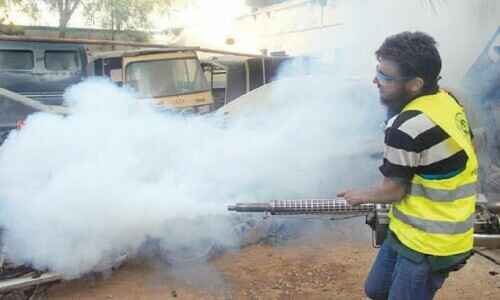PESHAWAR: Since the government approved the Dengue Action Plan 2024 last week, the health department has accelerated coordinated efforts with line departments to prevent Dengue Haemorrhagic Fever.
Although there haven’t been any confirmed cases this year, efforts are being made to keep the vector-borne illness under control. Strong viral surveillance across the province should be the main focus of prevention, Dr. Irshad Roghani, director of public health at the directorate-general health services, told Dawn.
He stated that the Dengue Action Plan (DAP), 2024 was approved by the government last week. He continued by saying that they were positive that the plan will be implemented in the province without any problems.
“Although other districts were also covered as per plan, we are concentrating on the high-risk districts of Mardan, Khyber, Peshawar, Nowshera, and Haripur because these districts were endemic and cases were regularly reported from there,” the official stated.
Official: To implement the initiative, the health department has requested Rs145 million.
A month ago, according to Dr. Irshad, a positive case recorded at a private laboratory was found to be fraudulent upon retesting at Khyber Medical University’s Public Health Reference Laboratory (PHRL).
He said, “We have also directed all 36 district officials to submit samples from symptomatic patients to PHRL for verification.”
According to him, the province saw 22,000 dengue cases and 18 fatalities in 2022, but in 2023 there were only 747 cases. According to him, the majority of the cases came from other cities and regions. He explained, “As per plan, we inspect 40 houses in the neighborhood of a positive case to make sure the disease carried by mosquitoes doesn’t spread.”
According to Dr. Irshad, female health workers played a great role in illness surveillance and larva detection. He continued by saying that after 283,000 homes in the province were inspected, 150 of them had larvae that needed to be removed right away.
He said that 41 entomologists had been sent out to assist the health department in identifying and eliminating mosquito larvae as well as bolstering surveillance, which had led to a decrease in instances over the previous year.
Every district has dengue preventative response units, according to the public health director. He continued by saying that such units acted quickly in the event of an illness and made steps to prevent the dengue virus from spreading by mosquito production.
According to Dr. Irshad, efforts to raise public knowledge of the disease’s causes are ongoing. Teams from the health department visit homes and schools to educate people about how to destroy viruses and prevent them from reproducing.
“We are conducting inspections of tire shops in coordination with district administrations because they are the primary location for mosquito breeding because of water buildup within,” he stated.
He noted that the proposal to guarantee full-fledged preventive work was approved by the administration. “In order to carry out the plan, we have requested Rs. 145 million,” he stated. He continued by saying that over the previous three months, 82,000 people, both men and women, attended 35 walks and lectures.
Dr. Irshad stated that the health department was making sure that water pools were eliminated, making dengue “completely” prevented. In order to handle dengue cases locally, he continued, training programs for physicians, nurses, and paramedics had also been set up.
He stated, “In addition to awareness and surveillance, case management training for physicians, paramedics, and nurses is also underway to ensure that the cases are diagnosed promptly and isolated to prevent spread of the infection.”








